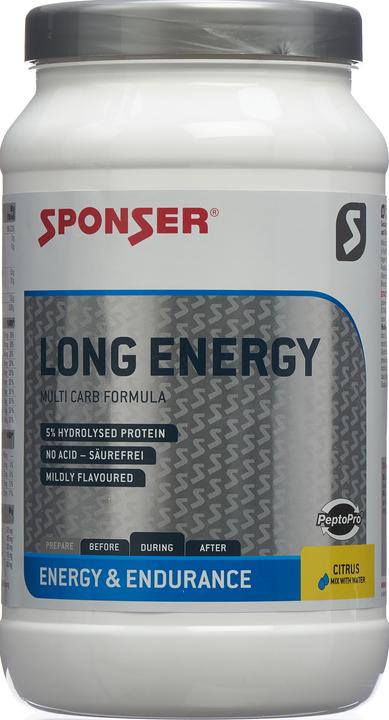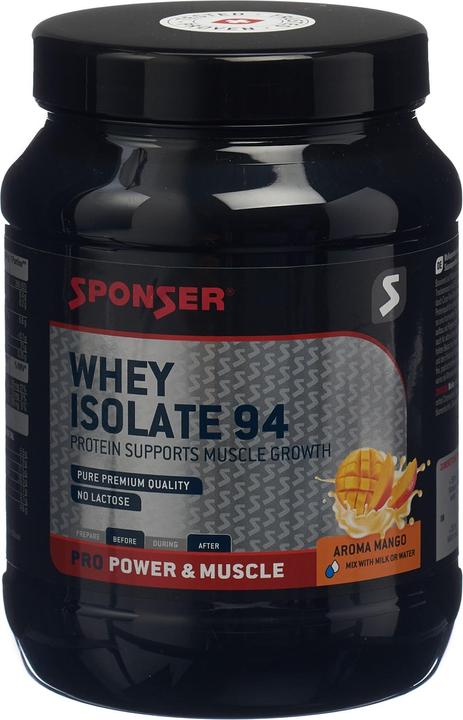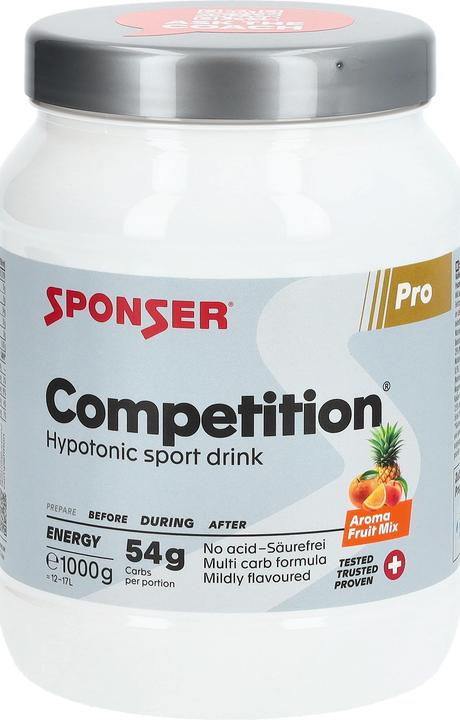

Triathlon: Nutrition of a top athlete
Ruedi Wild is a household name in the Swiss triathlon scene. A member of the national team for over 16 years, he has travelled through all stages of the triathlon - from school athlete to sprint distances to Olympian to successful Ironman athlete.
Due to the high intensity of training, triathletes need to be very precise with their nutrition. In this article, the "Swiss Triathlete of the Year 2017" shares his experience and knowledge of sports nutrition with us.
About the person
**What does a normal training week look like for you?**
I do my first training session early in the morning. Swimming, for example. Then I go to the office at Sponser at 08:00 (over the year as a whole, I work almost 50 per cent) until lunchtime. After lunch, I usually have a short lie-down, followed by two more training sessions. A bike ride followed by a short run and then sometimes a few intensive sets in the gym to finish off. Depending on the training phase, competition phase and training focus, I end up training for around 14 to 40 hours a week. On average over the year, I have an estimated 24 hours of training per week.
**How many competitions do you take part in per year?**
It's usually between eight and twelve competitions per year.
**How long is your recovery time in a training week and after a competition?**
That depends on the intensity and duration as well as the level of training and the type of sport. After swimming and cycling, I can stress my body again more often and more quickly than after running training. However, it varies depending on the time during the season. After intensive sessions, I certainly need 48 hours before I can stress my body again accordingly. Loose regenerative units promote recovery (blood circulation) and are much better than being passive.
I need 3 days to recover after an Olympic distance, around 6 - 7 days for a half Ironman and several weeks after an Ironman.
**What was your personal highlight in your career?**
My 2nd place at the European Championships as a junior was the most emotionally impressive, as it was quite unexpected for me. The World Championship title with the Swiss team in Des Moines (USA) in 2013 is also still a fond and wonderful memory for me, as we were the "nobodies" and also came through completely unexpectedly against the big and strong nations. Individually, the other athletes were clearly stronger on paper, but as a team, the four of us were unbeatable back then. In sporting terms, third place at the Ironman 70.3 World Championships in Australia in 2016 must be rated very highly.
**What is your dream and/or goal?**
From a sporting perspective, I want to be able to look back on my sporting career with satisfaction. I want to be able to say that I have maximised my potential and always remained true to my moral and social principles. For me as a professional, the value of sport goes far beyond the results. Sport has given me a great deal on various levels - numerous friendships and many great experiences, for example, but also the odd disappointment or hard lesson for life. I was able to get to know many parts of our world in a privileged situation.

Nutrition in general
**What does your diet look like as an endurance athlete? Do you have a nutrition plan?**
I don't have a programmed nutrition plan. However, I eat a varied diet that is adapted to my daily training routine. If possible, I don't eat processed (and therefore usually low-quality) products that are also high in sugar - such as sweet drinks, sweetened yoghurts and the like. In general, I eat as much as possible that is found in nature: lots of vegetables, meat, dairy products and nuts. In any case, I very rarely eat pasta because it's not ideal for me as an endurance athlete.
**Do you count your calories at every meal and read the back of the packaging first?**
Counting calories? Certainly not. Nor is it necessary if you eat properly. The body gives you a sign, or the feeling of hunger disappears, when you have eaten enough and, above all, the right things. Our body takes on so many tasks and can regulate itself. It's the same with food. I don't believe that the body itself recognises calories, that's an invention of industry. However, unlike many people, it can tell what is good for it and what is not. Unfortunately, a very large part of our diet today is total nonsense, and even worse: because of marketing, people have the feeling that they are actually doing something good and healthy for themselves.
In this context, I look closely at the back of the packaging - the more that is listed, the more likely I am to steer clear of it.
**How does your conscious diet differ from a "conventional" diet?**
Everything that grows and thrives naturally in our world is usually high in fat, has a certain amount of protein and a rather limited amount of carbohydrates. That's more or less how I eat. Compared to the average athlete, I certainly eat more fat, fewer carbohydrates and much less sugar. As a result, my body fat percentage has also dropped significantly and I have become more efficient, especially over longer distances. I wish I'd had the knowledge and experience I have today 15 years ago when I was really starting out in sport.
**Do you have any examples of meals that you eat on a normal day?**
I often eat eggs in the morning and prepare protein pancakes from Sponser in the pan. Cheese is also a must. I'm not hungry until lunchtime, despite the training. At lunchtime, I often have spaetzli with vegetables and a piece of meat. In the evening, especially in winter, I love pumpkin soup. I also eat meat or cheese, dried meat, avocado, nuts and a special bread that my wife bakes based on linseed flour and shredded coconut (high in fat and protein).
**What does your diet look like before, during and after a competition?**
This is when it makes sense for me to supplement my diet specifically with sports nutrition products. Before competitions, I eat more carbohydrates than usual, during the competition I eat energy that is as easily digestible as possible and afterwards I eat salt, protein and high-fat products.
What do you pay particular attention to around the competition?You should stick to tried and tested foods and not try anything new. Food should be easily digestible, i.e. preferably no fibre and nothing raw. Also: no pasta! They slow you down.
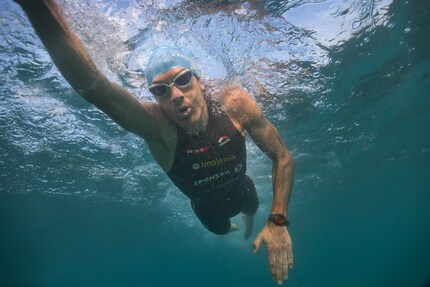
For sports nutrition
**What experiences have you had with sports nutrition?**
Sports nutrition products offer a high level of convenience, which is very important in our busy everyday lives. Few people have the opportunity to eat the right products from their everyday diet immediately before, during and after training or to prepare for this accordingly. What's more, this requires a great deal of knowledge and a certain amount of time. In this context, I have had very good experiences with the right sports nutrition products. Especially during the regeneration period and hard training sessions. However, I have to say that there are a lot of inferior products on the market, which really makes me wonder how such things can be sold and consumed at all.
**Which ingredients are important for which type of training session?**
Basically, specific and targeted nutrition makes sense for intensive (interval training) or long units. Here, for example, high training quality and rapid recovery are required.
Interval units:
Most people do best with carbohydrates as fuel during intervals if they are not fat-adapted. I make sure I have a non-acidic drink with various short and long-chain carbohydrates and salt (sodium). This is much easier than solid food in this context. A gel with water is also a practical alternative. Amino acids during exercise can also help to boost recovery as early as possible.
My ideal drink for this is "Competition" (or now also "Ultra Competition") from Sponser. In addition to the staggered, long-lasting energy release, another important point for me is that the drink is acid-free. This makes it easier on the stomach and also gentler on the teeth. This also makes the drink less sweet, which is much more pleasant during exercise. 99 per cent of sports drinks on the market contain a lot of acid and consuming them in sips, at worst over a long period of time, severely attacks the teeth and causes unpleasant bloating in the stomach.

The "Long Energy" offers the same plus points and, in addition to the various carbohydrates, also contains easily digestible amino acids, which has a positive effect on recovery time.
Endurance units:
Up to approx. 90 minutes: Mainly water and, if necessary, dissolve electrolyte tabs in it.
From approx. 90 minutes: Here I mainly employ the electrolyte tabs, which I dissolve in water. This replaces the electrolytes that have been sweated out, mainly salt (sodium). If I need energy (carbohydrates), I like to use solid food on the bike. For example, the Oat Pack bars or the savoury High Energy Bar (liquid energy is easier on the run, see Interval). A banana would also be an alternative.
Metabolic training:
These usually long, mainly relaxed sessions are all about training your fat metabolism, i.e. becoming more efficient at using and metabolising fat as energy. As far as possible, no carbohydrate or sugar is consumed as energy or only as little as possible over a longer period of time in order to complete the session. Water with functional substances (such as green tea extract), such as low-carb burner powder, which can simply be dissolved in a water bottle, is ideal for this. During longer workouts, you need to pay attention to your electrolyte balance, which is why I mainly use the "Electrolyte Tabs".
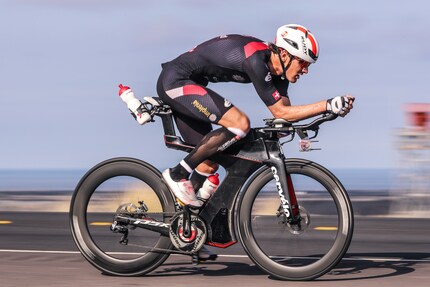
**What should you do before, during and after a competition?**
Before the competition, you should plan enough time between your meal and the start of the competition. This can vary depending on the sport and distance. Basically, you should eat what you are used to from hard training sessions. But preferably no fibre and generally easily digestible foods. I usually eat another bar about 30 minutes before the start. Usually the High Energy Bar.
During the race, I also eat what I'm used to eating during training. Usually a drink, as it is the easiest to absorb. On a downhill run, half a High Energy Bar if possible. When I'm running, I take water from the refreshment point and the gels, which contain additional caffeine (Liquid Energy Plus) or an extra portion of salt (Liquid Energy Long), depending on how I'm using them. I generally make sure that I consume around 80 to 90 grams of carbohydrate on the bike and 60 to 70 grams of carbohydrate during the race. In warm temperatures, I also take Salt Caps, although there is already a certain amount of this in my drink.
I'm not usually hungry straight after a race, but eating something in the first hour after the race is the most important thing for recovery. Carbohydrates, proteins and amino acids are important. That's why I usually have a "pre-/after-race" with the right combination of carbohydrates and proteins, which I drink immediately after the finish. After hard training sessions, I mainly take Pro Recovery, which also requires a shaker. Otherwise, I also often have a source of carbohydrates, such as muesli or bars, and a quickly available protein source such as Whey Protein. After that, I rely on my body feeling, take what I'm "craving" and hit the finish line buffet.
Frequently asked questions
What products does a triathlon beginner need
?
- Suitable sports drink for energy, fluid and salt/sodium during hard and long sessions
- Drink with electrolytes as a replacement for pure water during training
- Gel when running
- Regeneration aid (especially high-quality protein together with carbohydrates)
What tips do you have for dealing with sports nutrition?
- Consider where and when it makes sense to use it! Keep in mind the purpose of the training you are doing (interval vs relaxed endurance)
- The basis is general nutrition. Supplement sports nutrition where it helps and makes sense (for time, functional reasons, etc.)
- Generally pay attention to quality - you only have one body and one health. What's more, food is our petrol
- The quality is often very questionable, especially with protein products. But you shouldn't expect much from any dumping prices, even if the marketing often seems quite good.
What are the biggest lies when it comes to sports nutrition?
- Sports nutrition can be used to compensate for a lack of basic nutrition
- General recommendations from suppliers without even asking about your purpose and goal. They often simply offer a single product, which they then recommend across the board for all purposes, sports, etc.
- Sports drinks in everyday life vs. training. Sugar makes you fat without exercise. Provides energy without leaving you feeling full. There is no need for added sugar in the mostly relaxed and short training sessions (one hour), and certainly not in everyday life! It is therefore best to avoid supposedly "healthy" orange juice, apple juice, etc. They are the biggest evil. They are the greatest evil. Enjoy fruit in its real, natural form
- A lot of hidden sugar in products where it is not necessary. At least two thirds of all supposedly healthy "protein bars" are real sugar bombs!
Which products should every triathlete have at home?
- Functional sports drink
- Regeneration aid with high-quality protein for the immediate time before and after training
- Activator: The extra caffeine kick before hard sessions and competitions. This has already helped me out of a jam a few times.
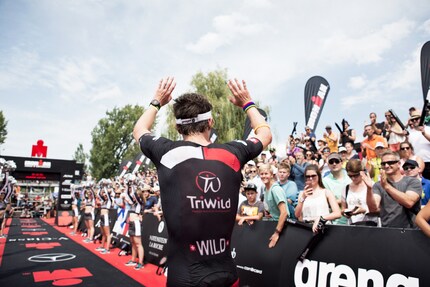
**Is it possible without these products?**
Theoretically yes, especially in everyday life. However, it requires in-depth knowledge (what and when) and appropriate preparation time (cooking and shopping). However, convenience is very important in today's everyday life, which means I can go straight from work to training, for example, without having to spend a lot of time cooking and shopping. Practically speaking, however, I don't know how I would get through a competition without the products.
Want to find out more about Ruedi Wild? Why not take a look at his website, Facebook, Twitter or Instagram.
Whether in sports, everyday life or on my travels around the globe, I'm always on the lookout for a new adventure. My passion for action has no limits - I love riding the waves on a board or with a kite, cycling across Switzerland on my bike and scoring goals on the football field every week. My job as Sports Marketing Manager at Galaxus gives me the chance to bring my passion to the workplace.
Interesting facts about products, behind-the-scenes looks at manufacturers and deep-dives on interesting people.
Show all